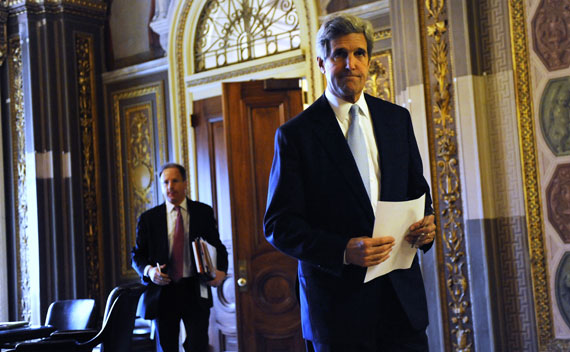Guest Post: Treaties and Filibusters
More on:

My colleague, Kay King, wrote a Council Special Report last fall on Congress’s dysfunctional role in national security policy. In light of the passage of the New START treaty in last month’s lame duck-session and with the 112th Congress set to convene tomorrow, I asked her for her thoughts looking both backward and forward.
The Senate surprised many of its critics when it passed the New START treaty during the lame-duck session, placing U.S. national security interests above partisan politics. In voting to support the resolution of ratification, thirteen Republicans joined fifty-eight Democrats, refusing to politicize what has generally been viewed as a relatively modest treaty to reduce U.S. and Russian strategic nuclear stockpiles. Despite some heartburn among GOP senators about timing, the vote proved to be a win-win for all involved. Most important, it represented a good “start” toward correcting a nearly thirty-year deterioration in Congress’s national security role, demonstrating that consultation between the executive and legislative branches, careful consideration, and debate culminating in an up-or-down vote can occur in the twenty-first century Senate.
The vote was a victory for treaty proponents on both sides of the aisle, particularly Senate Foreign Relations Committee (SFRC) Chairman John Kerry (D-MA), who led the fight in the Senate, debating opponents, managing amendments, coordinating with the administration, and ultimately orchestrating the bipartisan coalition that voted in favor of the treaty. It was a triumph for Sen. Richard Lugar (R-IN), ranking member of the SFRC and the Senate’s leading expert on arms control and nuclear non-proliferation issues. He skillfully addressed the range of concerns raised by many of his GOP colleagues and stood firm when the Senate Republican leadership sought to undercut his expertise and authority by trying to delay the vote. It was a win for the twelve other GOP senators who voted for the treaty after raising concerns and winning concessions that strengthened the final product. It was a gain too for those twenty-six lawmakers who voted against the treaty. Although they did not defeat the treaty, they did obtain commitments from the Obama administration to modernize the nuclear arsenal and laid the groundwork for what is likely to be a much tougher future battle over the Comprehensive Test Ban Treaty.
Of course, the administration succeeded in securing President Obama’s most important foreign policy objective for 2010, relying on the significant powers of persuasion of three Capitol Hill veterans – the president himself, Vice President Joe Biden and Secretary of State Hillary Clinton. The administration’s early-and-often consultations with Senate leaders on both sides of the aisle proved that consultation is worth the time and effort.
Most of all, treaty approval was a victory for the American people, who will be more secure thanks to the New START treaty’s provisions. As important, they witnessed a U.S. Senate that embraced its national security role -- taking six-plus months to review the treaty, holding more than twenty hearings and briefings, advancing the treaty out of the SFRC on a bipartisan vote, and debating it over a period of eight days on the Senate floor before a final vote. Despite some dilatory tactics that, if successful, would have kept the thirteen departing senators of the 111th Congress who had been part of the half-year long deliberative process from voting, and instead allowed newly-elected senators to step in, the outcome demonstrated that partisan differences can be bridged in the national interest.
Unfortunately, such cooperation has been a rare occurrence in recent years, particularly on matters such as arms control that are of little interest to the American voter. The potential for gridlock still looms large as was demonstrated by the raft of end-of-session filibusters that prevented the New START treaty from reaching the Senate floor until the very last minute and that brought the FY2011 defense authorization bill and the “don’t ask don’t tell” votes to the brink of defeat at the hands of the legislative calendar. In addition, the need for supermajorities on even routine matters resulted in zero budget or appropriations bills getting approved by Congress in 2010.
So, despite its institutional accomplishment on New START, it is time for the Senate to reform its rules, particularly those pertaining to unlimited debate or filibustering and anonymous holds or secret filibusters. As Senator Tom Udall (D-NM) recommends, the start of a new Congress is the appropriate time to make rules changes, so tomorrow, when the new 112th Congress convenes, the Senate would serve itself and the country well by amending its rules. Any one of the following changes recently floated by lawmakers and congressional scholars could go a long way toward easing the Senate stalemate:
- establish a series of cloture votes, reducing the number of votes required to end debate on each subsequent vote; or
- place the burden on the filibustering senator by compelling him/her to hold the floor, tying up all other business in full view of his colleagues and C-SPAN; or
- put the onus on filibuster supporters by requiring them to engage in a continuous session and garner forty votes every several hours in order to continue debate; or
- force the minority to be present by changing the vote requirement for cloture to three-fifths of all senators present and voting; and
- eliminate anonymous holds (silent filibusters) on legislation and nominees.
Such changes would not eliminate the filibuster, thus preserving opportunities for the minority to be heard. They would, however, prevent it from being utilized to completely obstruct action and therefore alleviate the gridlock that has become a hallmark of today’s Senate. For additional information on Senate rules changes, read the coverage in the New York Times, the Washington Post, Politico, and the Atlantic.
More on:
 Online Store
Online Store